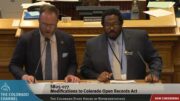By Jeffrey A. Roberts
CFOIC Executive Director
In a victory for public access to court records, an Arapahoe County judge on Thursday ordered the unsealing of transcripts in the case against death-row inmate Sir Mario Owens.
District Court Judge Gerald Rafferty also opened the index of court filings, known as the register of actions. But information on the whereabouts of protected witnesses will be redacted before any records are made public.
Rafferty made the ruling at the request of a consortium of media organizations, the Colorado Freedom of Information Coalition and post-conviction attorneys for Owens.
Transcripts of proceedings held in open court have been kept secret even though Owens and Robert Ray were sentenced to die more than five years ago for killing Javad Marshall-Fields, a witness in a murder case against them, and Marshall-Fields’ fiancée, Vivian Wolfe. Searching for Owens’ name and the case number in the CoCourts.com database produces no results.
“The public’s right to know what transpires in its courtrooms was vindicated today,” said Ashley Kissinger, an attorney for the CFOIC and the media group that includes The Denver Post, the Associated Press and The New York Times.
Rafferty ordered most of the transcripts sealed in 2007 because of “witness protection issues.” Prosecutors argued in a motion filed last month that witness safety is still a concern, and they called for the release of records with witnesses’ names, as well as their locations, to be blacked out at the expense of the person requesting the information.
“In this case, where a witness has been murdered and the court has made findings of ongoing danger to other witnesses, unfettered access to the entire court file cannot be authorized,” argued Chief Deputy District Attorney Ann Tomsic in her motion.
But Kissinger pointed out during Thursday’s hearing that witnesses were identified during court proceedings that were open to the public.
“The cat’s out of the bag,” she said. “It’s already been reported on. Anybody who attended those trials already heard those names.”
Calling the case “very frightening,” Rafferty said he shares the prosecution’s concern for witness safety. But he said the relevant issue is whether “there is a reasonable probability” that retaliation against witnesses will occur if the court now unseals records with their names intact.
“I can’t get there based on the evidence that’s in front of me,” the judge said, adding that the public’s right to the information is “very, very strong.”
Rafferty instructed the district attorney’s office to submit a motion listing which witnesses in the case should be deemed “protected,” meaning that their whereabouts will not be disclosed. Any location information in the register of actions will be redacted before it is made public. Transcripts of proceedings will be made public, if requested, but prosecutors will get a chance to review the material to make sure any location information has been deleted.
Jim Castle and other lawyers for Owens have tried to unseal the files in his case because they allege prosecutorial misconduct. During Thursday’s hearing, Castle noted that the public makes judgments about the fairness of the judicial system based on what they know about high-profile cases such as this one.
“The basis of our judicial system, the reason we trust it as citizens,” he said, “is because it’s open.”
Also asking the court to unseal records in the Owens case: The Colorado Independent, Gannett, KDVR-TV, KMGH-TV, KUSA-TV, KWGN-TV, the Reporters Committee for Freedom of the Press and the E.W. Scripps Co.
Follow the Colorado Freedom of Information Coalition on Twitter @CoFOIC. Like CFOIC’s Facebook page. Do you appreciate the information and resources provided by CFOIC? Please consider making a tax-deductible donation.




